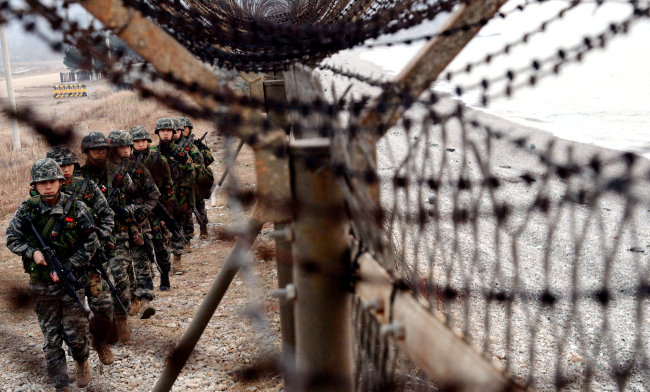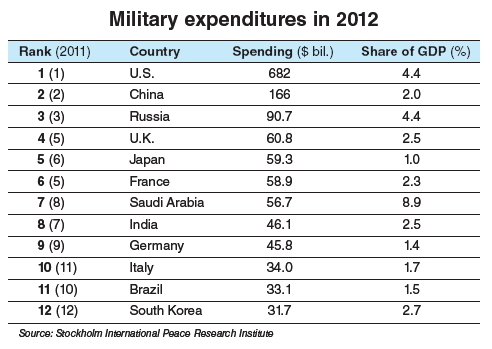For China, 2014 will be another challenging year as its long-simmering territorial row with Japan over a chain of islands in the East China Sea, called Senkaku in Japan and Diaoyu in China, is expected to further escalate.
Although Beijing will try to avoid letting the dispute have an adverse effect on its economy and regional stability, it is unlikely to make concessions on issues of territorial integrity, which it regards as an area of a “core” interest, analysts said.
“As China views the chain of islands as part of its inherent territory, it is unlikely to easily back down. The Sino-Japanese conflict may continue or escalate in the new year,” said Kim of Sungshin Women’s University.
“While taking into account domestic nationalist sentiment and China’s hard-won prestige as a great power, China may make cautious moves to protect core interests and allay tension with Japan.”
Territorial integrity is one of the six core interests defined in Beijing’s foreign policy whitepaper published in September 2011. The core interest represents China’s efforts to secure the breakaway regions of Tibet and Xinjiang, regain control of Taiwan and maximize maritime interests in the East and South China Seas.
The five other core interests are national sovereignty, security, social and political stability, unification and sustainable development.
To secure territorial integrity, China may continue to beef up its military hardware in the New Year. Beijing believes Tokyo’s push for a full-fledged military, collective self-defense and a stronger alliance with the U.S. is intended to contain China’s rise and could hurt its interests.
China’s military buildup has been a source of tension as neighboring states suspect that it seeks to unilaterally expand its territory or sphere of influence further into the Pacific, as seen in its recent demarcation of an air defense zone.
Beijing’s maritime assertiveness, especially in the South China Sea, where vital sea lines of communication converge and untapped resources are buried, has led to limited military conflicts with Vietnam and the Philippines.
The prevailing concern in the region is that China may seek to alter the status quo, restrict maritime rights such as the freedom of navigation and destabilize the security landscape in East Asia.
Some analysts say China’s growing sensitivity over its national pride could strengthen its propensity toward a hard-line stance over territorial disputes, particularly with Japan.
Looking back to a Sino-centric regional order hundreds of years ago, China has long sought to rebuild its national pride, which was hurt by a series of foreign invasions starting in the 19th century.
From the 1840-42 Opium War to China’s defeat in the 1894-95 Sino-Japanese War and Imperial Japan’s invasion during World War II, traumatic events have long disturbed the nation.
Some analysts also point out that the plethora of domestic challenges facing the Xi Jinping government may prevent it from risking a serious escalation of territorial conflicts. Those challenges include a slowing economy, income disparities, an economic divide between inland and coastal areas, rural development, political corruption, and increasing popular demands for political participation and political reform, including the need for the Chinese Communist Party to establish a more democratic modus operandi.
But in Chinese history, domestic conundrums did not always deter military action. Just a year after the foundation of communist China, it had not yet secured internal stability when it fought against the U.S. in the Korean War in the early 1950s.
In 1962, China went to war with India when it was reeling from the Great Leap Forward, a botched campaign to industrialize and collectivize China’s economy.
Then, in 1969, China engaged in an armed border conflict with the Soviet Union despite the extreme ideological upheavals of the Cultural Revolution, the notorious movement to enforce communism by removing all traces of capitalism from Chinese society.
To fend off containment threats from the U.S.-Japan security alliance, Beijing is expected to seek a deepening of diplomatic relations with South Korea and the 10-member Association of Southeast Asian Nations.
“China would actively seek closer diplomatic ties with neighboring states as a way to head off what it perceives as an attempt by the U.S. and Japan to militarily encircle it,” said Suh Jin-young, professor emeritus at Korea University.
“To insulate itself from pressure by Japan and the U.S. and advance further into the world, improving relations with neighboring states will be of greater importance than at any other time for Beijing.”
Building a “new type of great power relations” with the U.S. will also be a crucial foreign policy challenge for Beijing.
The new relationship will have to be based on mutual respect for each other’s “core interests.” Washington and Beijing may face difficulties in shaping this relationship due to their conflicting positions on human rights issues, Taiwan and territorial conflicts in the South China Sea, analysts said.
Washington’s push to deepen its military and diplomatic engagement in the Asia-Pacific region could also impede the efforts in building a mutually agreeable relationship.
America’s strategic refocusing on the region comes as China has become increasingly assertive since 2008, when the West suffered from a global financial crisis while China continued its growth and reaffirmed its confidence in its socialist system.
Japan’s push for a ‘normal state’
In the face of a more militarily assertive China and a nuclear-armed North Korea, Japan is expected to push for heavier armament and collective self-defense with the long-cherished goal of becoming a “normal state.”
Japan’s military buildup may increase tension with South Korea and China, two major victims of its wartime aggression which have long fretted about Japan’s possible reversion to militarism.
This year, Prime Minister Shinzo Abe is likely to further advance his nationalist agenda, including lifting Japan’s self-imposed ban on collective self-defense ― the use of force to aid an ally being attacked ― while prioritizing economic revitalization, a critical source of political legitimacy, analysts said.
“As (the Abe government) built the basic outline of its security policy last year, it will work to flesh it out in concrete terms this year. Tokyo is expected to further bolster its military hardware and spending,” said Park Young-june, a Japan expert at Korea National Defense University.
“On the economic front, Tokyo will introduce a series of policies to share the fruits of economic recovery with regular workers and consumers, while continuing to seek economic revitalization in line with the so-called ‘Abenomics’ stimulus policy.”
Amid China’s increasing assertiveness over the chain of islands in the East China Sea, Japan has strived to expand the restricted role of its military and strengthen the treaty alliance with the U.S. in a way that challenges its war-renouncing constitution.
In particular, with a drive for what Abe terms “active pacifism,” the prime minister has sought to alter Tokyo’s interpretation of Article 9 of the U.S.-drafted constitution to assume a greater security role in the region and beyond.
The pacifist clause blocks Japan from waging war and possessing potential war materials. It has long served as a basis for Japan’s long-standing, strictly self-defense-based security policy, which some have derided as part of an opportunist scheme to bolster its economic clout.
To institutionally support the country’s armament, Tokyo has recently created the National Security Council.
On Dec. 17, Japan also approved its first-ever national security strategy to “proactively contribute to world peace”; a 10-year defense guideline putting forward a policy direction to back up the strategy; and a five-year plan for military procurements to better safeguard its far-flung islands.
Under these plans, Japan seeks to establish its first marine unit, increase defense spending and procure early-warning aircraft, spy drones, more surveillance planes and warships, and in-flight tankers.
This year, Tokyo also plans to review its self-imposed ban on arms exports to help boost the defense industry, and to revise the U.S.-Japan defense cooperation guidelines to reflect the changing security conditions.
Critics say all these plans represent a disturbing departure from pacifism, particularly when nationalist politicians show a lack of atonement and remorse for Japan’s wartime atrocities, including the sexual enslavement of women.
Backed by approval ratings of more than 50 percent, Abe is expected to try harder in 2014 to put into practice his conservative agenda, which some analysts say could sink if Tokyo’s planned sales tax increase damages the economy.
Tokyo may also seek to strengthen security cooperation with Washington and regional partners like South Korea and Australia to counter what it perceives as threats from China.
Abe’s pursuit of a “strong Japan” comes as the country struggles to revive its national pride, undermined by a prolonged economic malaise, social anxiety from a series of natural disasters and the rise of once-weak neighbors such as China and South Korea.
For some four decades after its defeat in World War II, Japan had strictly adhered to pacifism under the so-called Yoshida Doctrine, a postwar national strategy focusing on economic growth and restoration of international trust based on security backing from the U.S.
Named after Yoshida Shigeru ― a former prime minister who laid the groundwork for Japan’s postwar foreign policy ― the doctrine had embraced pacifism to build Japan, at the time a defeated, pariah state, into an economic powerhouse, while depending heavily on the U.S. for security at the expense of its national pride.
The Yoshida Doctrine included the Three Non-Nuclear Principles, under which Japan vowed not to manufacture or possess nuclear arms or allow their introduction into the country.
It also included the Three Principles of Arms Exports, which banned the export of weapons to communist states, which were subject to U.N.-imposed arms embargos, and nations embroiled in armed conflicts. Japan had also limited its defense spending to less than 1 percent of its gross national product.
But this mercantilist doctrine began to lose its viability as Japan faced growing pressure to make more contributions to global stability in the 1990s ― a turbulent post-Cold War period fraught with ethnic, religious and other sociopolitical conflicts. At the time, Japan’s financial support for world peace was much derided as “checkbook diplomacy.”
By Song Sang-ho
(
sshluck@heraldcorp.com)








![[Herald Interview] 'Trump will use tariffs as first line of defense for American manufacturing'](http://res.heraldm.com/phpwas/restmb_idxmake.php?idx=644&simg=/content/image/2024/11/26/20241126050017_0.jpg)
![[Exclusive] Hyundai Mobis eyes closer ties with BYD](http://res.heraldm.com/phpwas/restmb_idxmake.php?idx=644&simg=/content/image/2024/11/25/20241125050044_0.jpg)
